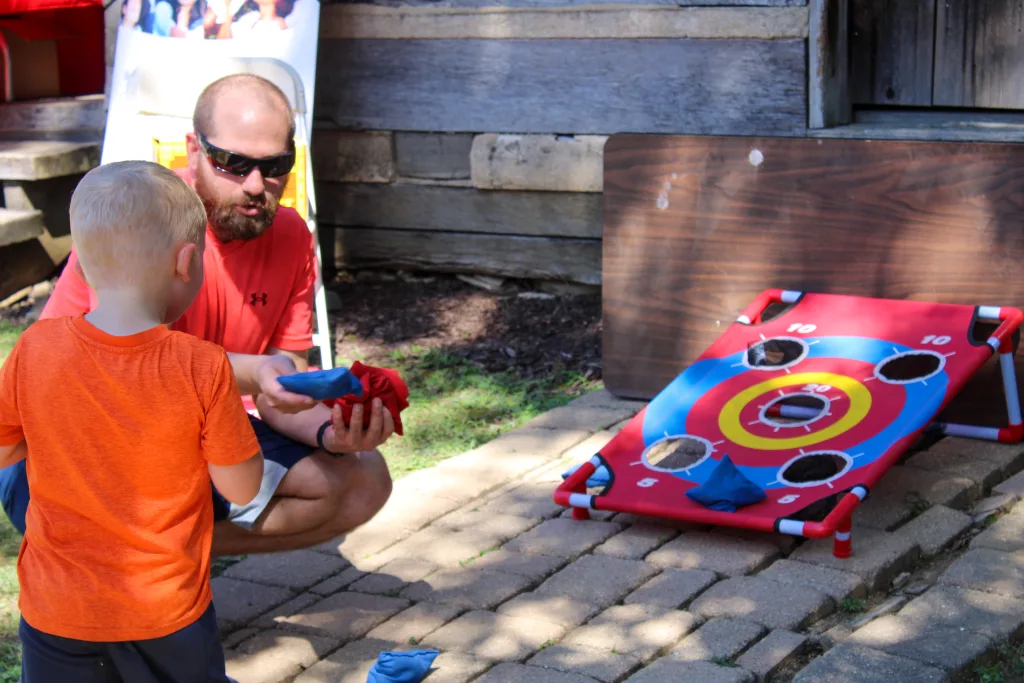Information Technology Support Associate Earns DSCC’s 2025 Award of Merit
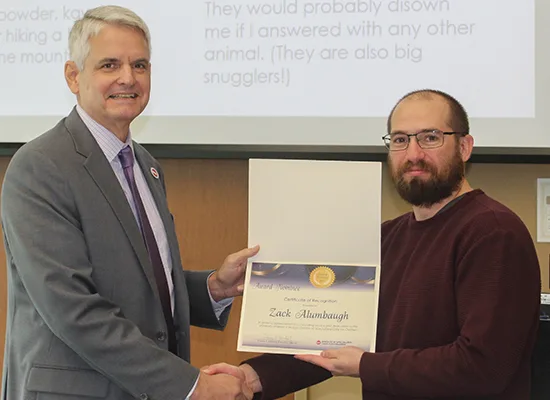
DSCC honors Zack Alumbaugh for his outstanding customer service, collaboration and dedication to serving Illinois children and families
Information Technology Support Associate Zack Alumbaugh is the 2025 recipient of the Award of Merit from the University of Illinois Chicago’s Division of Specialized Care for Children (DSCC).
The award recognizes exceptional DSCC employees for outstanding dedication and service to Illinois children with special healthcare needs and their families.
Zack joined the DSCC Information Technology (IT) team in 2020 and is based in our Central Administrative Office (CAO) in Springfield. His can-do attitude, dedication to resolving a wide range of IT challenges and kindness have made an impact in Springfield and beyond.

“Zack brings unwavering patience, creative problem-solving and genuine empathy to every interaction and challenge he faces,” DSCC Executive Director Thomas F. Jerkovitz said.
“His expertise and caring attitude have benefited every department at DSCC and given our team members the reliable support they need to best serve our participants. He understands the importance of DSCC’s mission and continually finds new opportunities to improve processes that, in turn, improve outcomes and services for families.”
Zack said he considers his role at DSCC to be much more than a job.
“What we do matters. We help participants and their families get access to assistance and care that makes a difference in their lives. DSCC is a shining example of the way a society can come together to care for each other and improve lives,” he said.
DSCC managers and colleagues nominated Zack for the award. They praise his outstanding contributions to the IT team, exceptional customer service and ability to resolve a wide range of technical issues with patience, professionalism and warmth.
“Zack skillfully bridges the gap between technology and the people who rely on it, demonstrating an extraordinary ability to anticipate needs and deliver clear, effective solutions. His remarkable capacity for communication has established him as a trusted resource across multiple departments, making him a linchpin in our organization,” said Andrew Nichols, Director of Information Systems, Security, and Compliance.
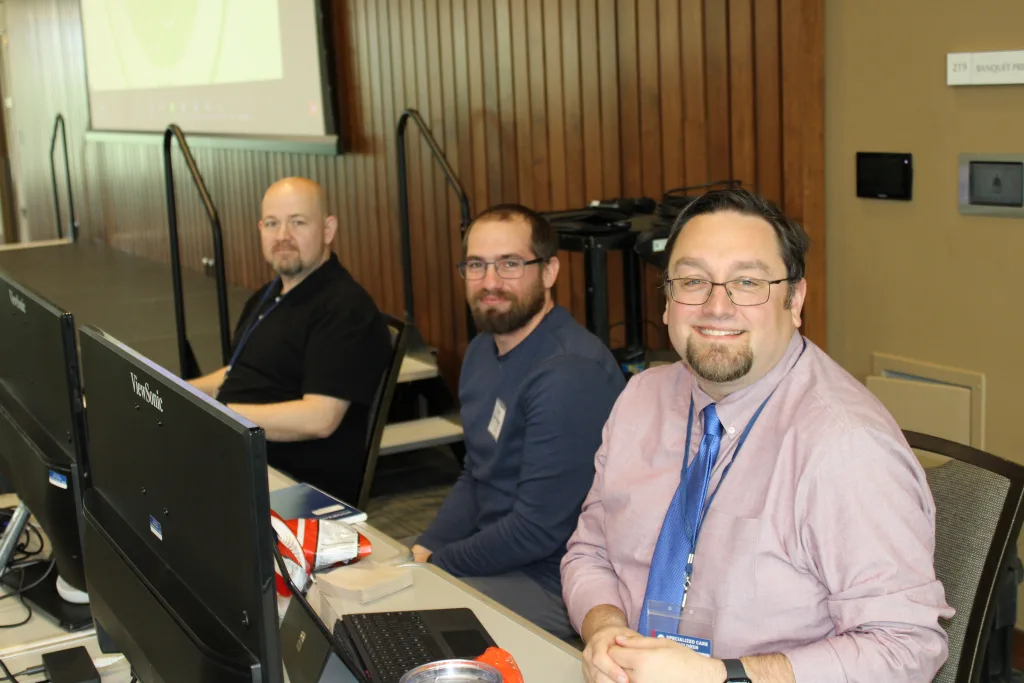
Whether the project is public-facing or behind the scenes, Assistant Director of Operations for Information Technology Greg Mayes says Zack’s combination of technical ability and exemplary customer service shines through.
“Zack’s incredibly intelligent with a great sense of humor and has a calming presence that puts everyone at ease,” Greg said.
Lombard Core Assistant Regional Manager Celestine Gatson couldn’t agree more.
“Zack’s work always, always, always exemplifies our mission. He’s always willing to be helpful,” Celestine said.
IT Training and Development Specialist Lynda Miller appreciates the many ways Zack “pours his heart into his work.”
“He never gives up on tough issues. He always follows through, and staff tell me how much they appreciate his support and his kindness,” Lynda continued. “Zack exemplifies our mission by collaborating with others, offering dependable support and building strong, trusting relationships across the team.”
Zack also enjoys spreading awareness about DSCC’s programs. He has supported key community outreach events, including the annual Illinois Statewide Transition Conference and the Sensory Station at the Illinois State Fair.
“At events, like the transition conference or other in-person meetings, he is quick to help and understands the importance of the work we do at DSCC. He works hard to ensure that things run smoothly and is willing to help in any way possible to ensure that everyone has a great experience,” said Benefits Management and Data Analytics Manager Brittani Provost.
Springfield and St. Clair Assistant Regional Manager Kathy Thomas praises Zack’s ability to get to the root of an issue and see it through.
“I have also seen him help at the Illinois State Fair. He gets out and talks with the families, playing games with the kids. It is great to see him out there promoting DSCC,” she said.
Zack joined DSCC at the encouragement of his mother, Stephanie Alumbaugh. Stephanie has worked at DSCC for over 20 years and received the Award of Merit herself in 2011 through UIC.
Zack calls this honor a “full-circle moment” for his family. He says he couldn’t be more thankful for the opportunity to work at DSCC and “get to do stuff with tech every day.”
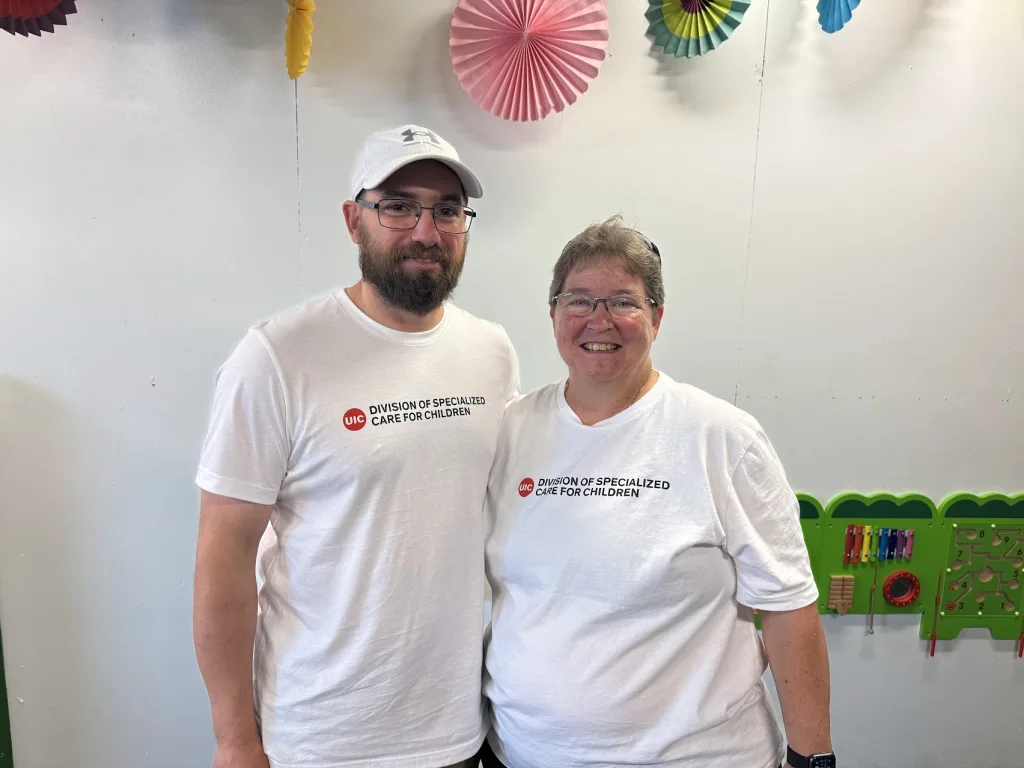
“I really enjoy getting to help people and maybe teaching them a little bit about how the computer works. It’s just really satisfying for me,” Zack added.
Zack also appreciates how DSCC supports his continued growth and professional development. He’s currently pursuing his master’s degree in Management Information Systems.
Zack says he’s proud to play a role in supporting DSCC participants and their families.
“Knowing what DSCC does…even if you’re having a rough day professionally, that really puts everything in perspective,” Zack said. “I don’t know what else somebody could ask for in a job. We get to help people every day.”
Learn more about Zack and his impact on DSCC in this short video:
DSCC staff nominated a total of 11 of their colleagues for this year’s Award of Merit. As the winner, Zack will receive a memento, a $2,500 award and recognition from the Executive Director.
Congratulations to all of our outstanding 2025 DSCC Award of Merit Nominees:
- Shanna Berg, Customer Service Specialist
- Deanna Deleshe, Core Regional Manager
- Cheryl Golliher, Core Care Coordinator
- Rebecca Grzeslo, Core Program Coordinator Assistant
- Andrea Hoskinson, Assistant Director of Operations Finance, Accounting, and Procurement
- Darlene Jones, Home Care Quality Improvement Specialist
- Beth Niemerg, Core Care Coordinator
- Haley Phelps, Interim Relief Program Manager
- Tiffany Riddle, Core Enrollment Specialist
- Rita Storck, HC Care Coordinator
See photos of the 2025 nominees in our 2025 Award of Merit luncheon photo album on Facebook.
Create Holiday Magic with Inclusive Fun for Everyone!

Celebrate the holidays with our list of inclusive, sensory-friendly events happening across Illinois.
The holiday season is a time for joy, connection and shared traditions. For individuals with sensory sensitivities, medical complexities and other disabilities, typical celebrations may not always feel comfortable or accessible.
Every family deserves the chance to enjoy the season in ways that support their children and loved ones’ needs and allow for meaningful moments together.
We’ve gathered a list of inclusive and sensory-friendly holiday events happening throughout Illinois. These activities can help you experience the magic of the season at a pace and environment that works best for your family.
There are sensitive Santa opportunities, Mr. and Mrs. Deaf Claus, light displays, low-sensory celebrations, accessible theater performances and other welcoming events for children and adults with special healthcare needs.
You can check out our Special Events page for the full roundup of activities. Just like Santa’s list, be sure to check it at least twice as we continue to add events!
Please note that the University of Illinois Chicago’s Division of Specialized Care for Children (DSCC) is not involved in the organization or scheduling of these holiday events. If you have questions about a specific event, please contact the event sponsor or organizer.
Featured Events
- The Secret Sleigh Project coordinates volunteers to provide in-home Santa visits to children who are medically fragile nationwide. See our Secret Sleigh event listing for more details on how to request a visit.
- Autism Speaks and Cherry Hill Programs will provide free sensory-friendly Santa experiences at multiple shopping centers in Illinois on Dec. 7. You must sign up to attend. Photo packages will be available to buy.
See our Santa Cares listing for more details. Be sure to select “Santa Cares”, “Caring Santa”, or “Sensitive Santa” when checking your location. Event dates and times may vary. Please check your mall location to confirm your date and time. - Enjoy a movie on the big screen with the lights up, lower sound and the freedom to get up, dance, walk, shout or sing. Visit the following sites to find more details and a theater near you:
- Looking for holiday light displays to walk, wheel, or drive through? Maybe a parade, cookie walk or festival is more your style? Check out the websites and listings below to help plan your holiday adventures (note that some events may not be sensory-friendly):
Chicago and Northern Illinois
Check out WTTW’s list of holiday light displays and experiences. Kidlist also offers a huge list of Chicagoland drive-through and walk-through displays to help you get into the holiday spirit.
Other Chicagoland sensory-friendly activities include:
- Sensory-Friendly ZooLights at Lincoln Park Zoo and Sensory-Friendly Holiday Magic at Brookfield Zoo
- Special Kids Day Visit With Santa in Elmhurst
- Sensory-Friendly Holiday Express at Blackberry Farm in Aurora
- Breakfast with Mr. and Mrs. Deaf Santa Claus for Children With Hearing Loss in Chicago/ Desayuno con el Sr. y la Sra. Santa Claus Sordos
- “Abilities Team Winter Party” in Plainfield
- “Photos with Santa” for Children With Autism and Developmental Disabilities in Machesney Park
- Sensory-Friendly Winter Lights at Central Park in Oak Brook
- Winter Wonderland Celebration at the DSCC Mokena Regional Office
Central Illinois
Inclusive holiday parties are happening in central Illinois, such as:
- Cookies at the Clearinghouse/Evento Anual de Galletas en el Clearinghouse in Champaign
- Sensory Hour Sweets With Santa in Monticello
- “Special Time With Santa” in Taylorville
- Inclusive Holiday Dance in Springfield
- Lincoln Land Down Syndrome Society Christmas Party in Springfield
For more ideas, check out Chambanamoms.com’s roundup of holiday season fun for families and Visit Springfield.
Southern Illinois
There are many hometown holiday parades, concerts and festivals throughout the area. You can check Southern Illinois Families (SI Families) and Southernmost Illinois for lists of events.
Inclusive activities include:
- Sensitive Santa Event for Children With Autism and Other Sensory Differences in Marion
- St. Louis Zoo Wild Lights Sensory-Friendly Night
- Christmas Open House with Santa in Benton
- Santa at the Center in Effingham
- “Milk and Cookies with Santa” for All Ages and Abilities in St. Louis – Chesterfield
Have an Event to Share?
If you know of an inclusive or sensory-friendly event to include in our list, please email us at dscc@uic.edu.
Resources to Recharge
The hustle of the holiday season can feel overwhelming.
There are resources available if you need to step back and take a deep breath.
You can search our website for support groups and helpful webinars. On Dec. 11, the “How to Keep from Kicking Santa Claus – Tips for Managing Holiday Stress” webinar will feature practical tips for relieving stress, preventing meltdowns and strategies for creating your own fun.
Our Caregiver Mental Health Toolkit is also a great resource during the holidays and beyond.
Happy Holidays!
Honor National Family Caregivers Month by Caring for Yourself
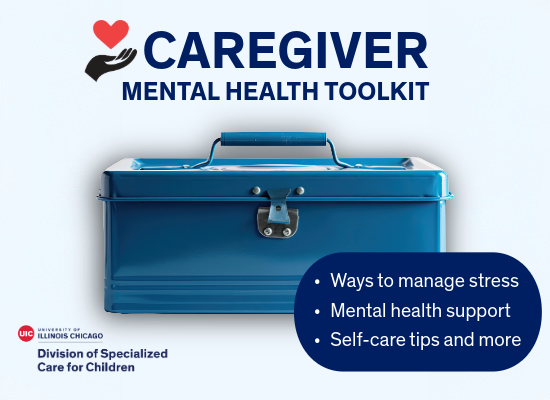
We’ve developed resources to help you support your mental health, reduce stress and connect with others who understand.
November is National Family Caregivers Month, a time to recognize and celebrate the incredible dedication of families caring for children and youth with special healthcare needs.
At the Division of Specialized Care for Children (DSCC), we know that caregiving can be both a rewarding and challenging journey.
As you care for others, it’s just as important to take care of your own mental health.
Find Support in Our Caregiver Mental Health Toolkit
Our Caregiver Mental Health Toolkit can help you find the support and strategies you need to recharge and stay well.
This online resource offers practical tips, self-care strategies and mental health resources to help you navigate the unique demands of caregiving while prioritizing your own health and well-being.
The Caregiver Mental Health Toolkit includes:
- Stress management strategies and techniques to help you cope with tough times.
- Self-care tips and practical ways to nurture your own physical, emotional and mental health.
- Mental health support resources to connect you with professional help and support networks when needed.
- Apps, online tools, videos and podcasts you can access anytime.
We created this toolkit with input from our Family Advisory Council, which shared the importance of mental health support for caregivers like you.
Whether you’re a parent caring for a child, a family member supporting a loved one or anyone in a caregiving role, we encourage you to explore this free resource.
Connect With a Fellow Caregiver for Support
One of the most powerful supports you can have is a connection with another parent who truly understands.
We have a Home Care Family Outreach Associate on our team who understands the unique challenges of caring for a loved one with complex medical conditions firsthand.
Our Home Care Family Outreach Associate works to create a community for caregivers within DSCC and offer heartfelt support, connection and empowerment.
You can ask your DSCC care coordination team to refer you to the HCFOA. You can also email a request to speak with the HCFOA at DSCC-FamilySupport@uic.edu.
Learn more about Erica Stearns, our current HCFOA, on our Home Care Family Outreach page and in the short video below:
Take a Break with Caregiver Coloring Sheets
We’ve also designed four coloring pages to help caregivers relax and take time to relieve stress and practice mindfulness.
There are four designs available in both English and Spanish:
- Lighthouse (Lighthouse in Spanish)
- Sunflowers (Sunflowers in Spanish)
- Hot air balloons (Hot air balloons in Spanish)
- Gears and clock (Gears and clock in Spanish)
These printable pages are a simple way to pause, relax and focus on yourself.
More Mental Health Resources and Support
You can find more mental health resources in our online Resource Directory.
Be sure to also follow our DSCC Facebook page and Instagram page for helpful reminders and tips throughout the rest of the month.
Your DSCC care coordination team is also here to support you. They can listen, help identify your needs and find available services and resources.
As the heart of your child’s care team, we celebrate you this month and always!
DSCC is on Instagram!

Join us as we grow our online community to share resources, family stories and more.
The Division of Specialized Care for Children (DSCC) is now on Instagram!
Follow @UICDSCC to stay connected and find:
- Helpful resources and tips for navigating care and services
- Family stories that celebrate our participants’ strength and unique experiences
- Upcoming events and learning opportunities
- Encouragement and inspiration from families and DSCC team members across the state
Our Instagram page is another way we’re working to keep you informed, supported and connected to the information and resources you need.
We can’t wait to see you there!
Update on Federal SNAP Benefits and Food Resources for Families

DSCC can help our participant families find food pantries and other resources as the federal government shutdown continues.
UPDATED on Nov. 14, 2025 – The Illinois Department of Human Services says it’s working to distribute full Supplemental Nutrition Assistance Program (SNAP) benefits now that the federal government shutdown has ended.
IDHS expects the remaining benefit payments to be made over the coming days, with all SNAP recipients receiving their full November benefits by Nov. 20.
To check your Electronic Benefits Transfer (EBT) Card balance, visit IDHS: Illinois Link Card or call the Illinois Link Help Line at (800) 678-LINK (5456).
SNAP recipients can still use their benefits left on cards from previous months.
Visit snapfederalimpact.illinois.gov for the most up-to-date information from IDHS and to find food in your community.
Resources for Where to Find Food
If your family is affected by this change or needs food support, there are many local and statewide resources available:
- IDHS: Find Food website
- Find Food IL Community Food Map
- Find Food – We Got You Illinois
- Find Food – Feeding Illinois
- Find a Food Pantry or Food Bank in Illinois
- Chicago Food Programs – Greater Chicago Food Depository
- Illinois Department on Aging’s Provider Profile Search
- FoodFinder interactive food assistance map
- Freefood.org
- Findhelp.org resource locator
- 211 food programs and food benefits information
- USDA National Hunger Hotline at (866) 348-6479
- The Free Formula Exchange
These resources can help families locate nearby food pantries, meal programs and other nutrition supports. You can also find more information about local food pantries and other resources in our online Resource Directory.
If you have questions or need more assistance, please contact your Division of Specialized Care for Children (DSCC) Care Coordinator. We are here to help!
Important Update About Our Phone Menu Options

Details about our updated phone menu to help families more quickly connect with our team
It’s important that you can reach the right team member whenever you need help or have questions.
We want to share our updated phone menu to help you more quickly connect with our staff.
Our updated phone menu options are:
- Press 1 for Customer Service
- Press 3 to Dial by Extension
- Press 4 for Language Line
Please note: If you need to reach a staff member directly by their extension, you must first select option 3 (“Dial by Extension”).
Entering the extension at the start of your call will automatically connect you with our Customer Service team. Option 2 (the old Language Line) is no longer available.
We understand this change may be new and want to ensure you can get to the right person without any confusion. If you have questions or need assistance, our Customer Service team is happy to help explain these options when you call.
Our toll-free number, (800) 322-3722, remains the simplest and fastest way to reach anyone at DSCC.
Saving our toll-free (800) number and updating your Care Coordinator’s extension number in your phone’s contact list can help:
- Prevent you from mistaking our calls as spam, ensuring you receive important updates and support from your care coordination team
- Save time when you need to call us for assistance or have questions
- Ensure smoother communication whenever you need support or would like to share feedback
You may also reach us electronically through our general dscc@uic.edu email address or our Contact Us or Request a Callback forms on our website.
Save Time With the DSCC Family Portal
Our DSCC Family Portal is also available to help you communicate and share information more easily with your care coordination team.
You can use the Family Portal to:
- Send messages
- Sign documents
- View important letters
- See a list of providers and much more
To help you get started, we’ve created several tip sheets and videos for how to use the Family Portal. You can find these resources on our website’s Family Portal page.
If you have trouble accessing the Family Portal or need other support, please email dsccexternalhelp@uic.edu. A designated DSCC staff person will help you as soon as possible.
We hope you’ll take advantage of this helpful tool!
Update on DSCC’s New Claims Processing System
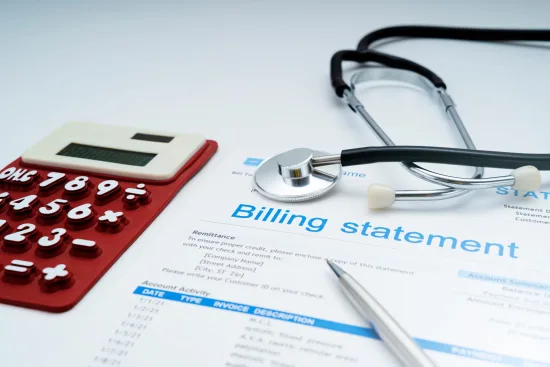
Find out what our participant families can expect as we continue to roll out CarePay, our new claims processing system
We want to share our progress as we implement a new claims system and explain what this change means for you.
In May, the Division of Specialized Care for Children (DSCC) launched our new claims processing system called CarePay. We developed CarePay to offer faster and more efficient claims processing.
We are continuing to work through the initial rollout and its related issues. Here is what our participant families can expect and need to know:
For Core Program Families
As we move to CarePay, you may experience some temporary delays with our claims processing. It could take up to 30 days for us to pay a claim.
If you or your child’s provider has been waiting for a claim payment for longer than 30 days, please contact us. We can verify that we have properly received your claim submission and investigate any issues.
If you have experienced a significant delay with a claims payment, please bring it to the attention of your care coordination team so we can help you.
For Home Care Program Families
- We are continuing to issue payments to nursing agencies at the updated 2025 rates. The rate increase received the necessary federal approvals in April, with an effective date of Jan. 1, 2025.
- We continue to work with our claims system developers on a plan for issuing “top-off” payments for adjusted claims we received between January and when CarePay went live.
- It is important for your nursing agency to double-check the accuracy of the claims it submits for reimbursement as we process these payments.
We understand that timely claims processing is important to you and your providers. We’re committed to resolving any issues as quickly as possible and ensuring you receive the support you need.
Thank you for your patience and partnership as we work through this transition.
If you have any questions or concerns, please don’t hesitate to contact us at (800) 322-3722.
Seeking Teens and Young Adults for Our Youth Advisory Council
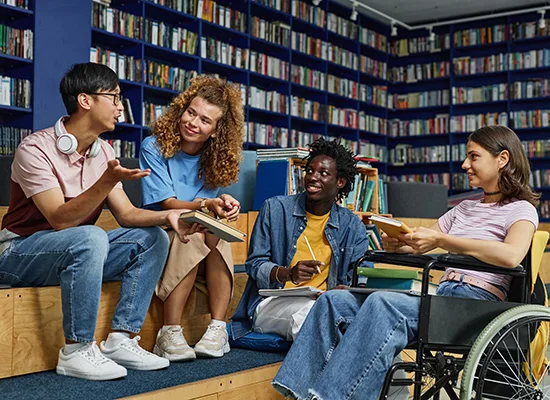
The council is a great opportunity to share your voice and help improve transition support for youth across Illinois.
Calling all teens and young adults with special healthcare needs in Illinois!
Would you like to make a difference? Your voice can help shape programs and services for youth like you across the state.
We are looking for new members to join our Youth Advisory Council (YAC).
The YAC is an opportunity to share your feedback and help improve planning for the transition to adulthood. You can also strengthen your leadership skills and connect with other youth.
As a YAC member, you can:
- Learn about and help improve how the transition to adulthood works for Illinois youth with special healthcare needs
- Help us gain a better understanding of your and your peers’ transition needs
- Give a voice to what matters most to you
- Gain valuable leadership and advocacy experience
- Expand your network
The council is open to all Illinois youth ages 15 to 24 with special healthcare needs.
You do not need to be a Division of Specialized Care for Children (DSCC) participant to join.
How to Join and Learn More
Members must complete an online application to join. (The application is also available in Spanish.)
Visit our Youth Advisory Council page for more information and answers to frequently asked questions.
You can also see the YAC flyer for more details:
If you have questions, please contact Claire Cook, DSCC’s Title V Program Transition Specialist, at clairer3@uic.edu or (800) 322-3722, ext. 21812.
Your perspective matters!
Free Virtual Training Program on Caring for Children With Complex Medical Needs at Home
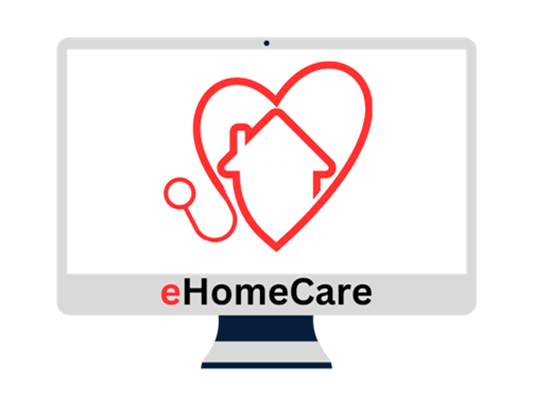
DSCC is proud to sponsor the expanded eHomeCare program to help families and home nurses improve their care knowledge and refresh their skills
We are excited to help expand a free online training program on how to care for children with complex medical needs at home.
Research shows that the number of children in need of medically complex care at home is steadily growing. With this growth, there is an urgent need for current and accessible educational resources to ensure the quality and safety of care for these children.
We’ve also heard from families and home nurses that they need a way to expand their knowledge about care in the home and refresh their skills.
The Division of Specialized Care for Children (DSCC) is proud to sponsor the expanded eHomeCare program to help meet this need and equip caregivers with the tools and knowledge necessary to provide high-quality care.
The eHomeCare program provides comprehensive, evidence-based information on the care of children with complex medical needs at home. The training is for:
- Family members and caregivers of children with complex medical needs
- Nurses working in home-based environments
- Physicians
- Respiratory therapists
- Students from health professions
- Anyone interested in learning more about caring for children with complex medical needs.
The eHomeCare program consists of eight on-demand courses to enhance the knowledge, skills and confidence of home care providers in the following areas:
- Caring for children with a tracheostomy with or without a ventilator
- Central line care
- Dialysis in home
- Infection control
- Setting boundaries in the home
- Skin care
- Range of motion
- Daily care activities for children
The courses aim to bridge knowledge gaps and enhance caregivers’ confidence and competence in managing both routine and emergency situations.
Please note that the completion of these training courses alone is not enough to demonstrate proficiency in skills that require specialized care (such as caring for a trach, ventilator or central line). If you are interested in becoming trained to provide these cares, please talk to your child’s medical team or home nursing agency.
Parents, extended family members, caregivers and others can use these modules to learn and refresh different skills for caring for their medically complex child in the home setting.
To learn more about the courses and enroll, visit the eHomeCare Online Training Program website.
After participating in the eHomeCare courses, individuals will be able to:
- Describe best practices for providing care and managing common issues for children requiring complex medical care at home.
- Recognize signs and symptoms of complications and determine appropriate responses when caring for children requiring complex medical care at home.
- Demonstrate enhanced confidence and competence in providing care for children requiring complex medical care at home.
- Collaborate effectively with healthcare team members to provide comprehensive and coordinated care for children requiring complex medical care at home.
Free continuing education credits are available.
If you have trouble enrolling in the course or need help, please email help@icep.wisc.edu.
The eHomeCare Program originally started as one course focused on trach and vent care through a partnership of several Wisconsin-based nursing schools and hospitals.
DSCC provided funding and collaboration to expand the eHomeCare training program in response to family feedback on the need for more education and training on caring for children with complex medical needs at home.
We partnered with the Illinois Department of Healthcare and Family Services (HFS) and the federal Centers for Medicare and Medicaid Services (CMS) to fund the project.
DSCC team members worked with eHomeCare developer Dr. Kim Whitmore and her team at Ujima United to add more courses to the training in collaboration with the Interprofessional Continuing Education Partnership at the University of Wisconsin-Madison.
We hope the expanded eHomeCare training modules will be a valuable resource for families, caregivers and everyone involved in their children’s complex care at home.
New Approval Process for Respite Nursing Services
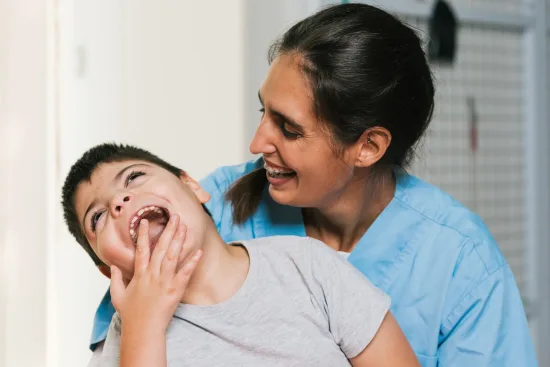
New approval process for respite care for individuals enrolled in the MFTD waiver begins on Sept. 1
Families enrolled in the Medicaid Home and Community-Based Services Waiver for Those Who Are Medically Fragile Technology Dependent (MFTD waiver) will see a new approval process for respite nursing services.
This change will help make respite nursing services more respectful of your wishes.
Starting Sept. 1, 2025, nursing agencies must get your permission and official approval from the Division of Specialized Care for Children (DSCC) before providing respite care to your child. This means a nursing agency or respite facility cannot use your respite hours unless you ask for them and agree to the plan.
Why This Change Is Important
We are making this change because families shared concerns that agencies and/or facilities used their respite care hours without their knowledge or permission. We want to make sure:
- You are always in control of when and how your family uses respite care.
- Respite services follow Medicaid and MFTD waiver rules.
- You know exactly how many respite hours are used and when.
What You Need to Know
- Each year, families in the MFTD waiver get 336 hours of respite care.
- Respite care is only available if the legally responsible adult (LRA) asks for it.
- Nursing agencies cannot use respite hours without your clear permission.
- If you request respite, the agency must fill out a form and get approval from DSCC before care begins.
- Respite hours don’t roll over to the next year and can’t be used as overtime.
If you think your child needs respite care, talk to your nursing agency about how many hours you want and when you need them. Please give them as much notice as possible (at least two business days before you need the care).
Your nursing agency will then contact DSCC to submit your request.
If something comes up at the end of the month and you need extra help, please talk with your nursing agency. They can work with you to request respite.
If you have any questions, please reach out to your DSCC Care Coordinator. They are here to support you through this process.
Thank you for your cooperation and partnership!



